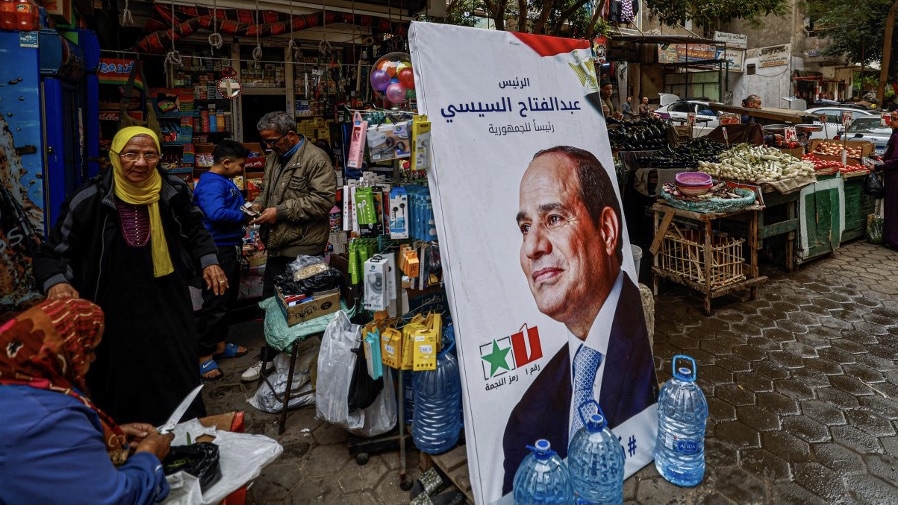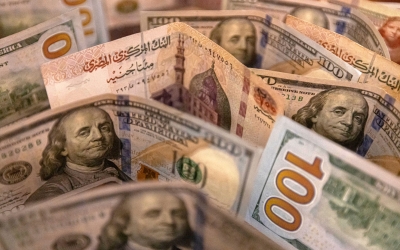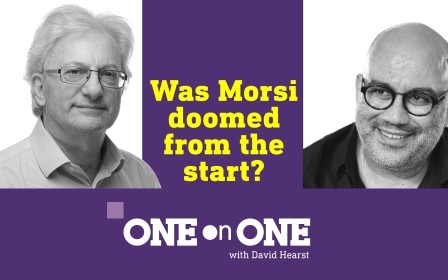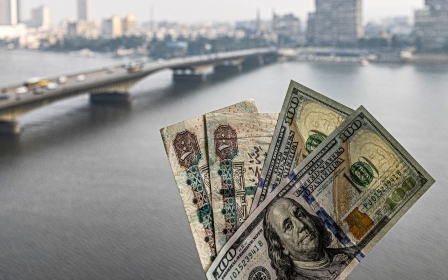Egypt under Sisi could spiral into a civil conflict

“By the pricking of my thumbs, Something wicked this way comes,” is the quote from Macbeth with which I start my new book.
I was in my late twenties when the coup that overthrew Egypt's first democratically elected president took place, and the massacres that followed sparked my obsession with the new military regime that was establishing itself there.
This decade-long obsession eventually led to me writing a book, Egypt under el-Sisi: A Nation on the Edge, in which I provide an anatomy of a regime unlike anything we have seen in modern Egyptian history.
In the book, I argue that, unlike its autocratic predecessors, Abdel Fattah el-Sisi's government is unique in two ways.
First, we are witnessing the only time in modern Egyptian history where the country is under direct military rule, with no civilian party to balance the military or to act as a civilian facade for the military's expanding power.
New MEE newsletter: Jerusalem Dispatch
Sign up to get the latest insights and analysis on Israel-Palestine, alongside Turkey Unpacked and other MEE newsletters
Second, the Sisi regime is pathologically wedded to mass state violence, not as a matter of choice, but as a matter of ideological necessity, making repression endemic and deeply entrenched in the regime's ideological edifice.
These features derive from the military obsession with the consolidation of power and ensuring that the mass protests of 2011 are never repeated - an obsession that has spawned a brutal military regime, with limited prospects of internal reform.
Military as state guardians
The book starts with the coup of 2013 and the summer of massacres that followed. That summer is identified as the foundational moment of the regime, where it was able to solicit mass popular support for a tidal wave of repression, first aimed at the Muslim Brotherhood, and later extended to the secular opposition.
This was only possible due to the incompetence of the Brotherhood and the complicity of the secular opposition, with its outright authoritarian streak, which allowed the military not only to intervene but to construct a narrative conducive to mass hysteria.
These acts of mass violence were justified through a chauvinistic version of Egyptian nationalism, which saw the nation as an organic whole, and the military as the guardians of the nation and the state, equating opposition to the military with treason and allowing the military to cast its opponents outside the national fold.
This justified the use of mass violence - with popular participation - to repress the opponents of the new regime, and for the military to embark on a grand political project: namely the full militarisation of the state and the economy.
This involved a myriad of legal and constitutional changes, which extended the power of the presidency over the judiciary, eroding whatever semblance of independence it still retained. The military's new and unprecedented constitutional role as guardians of the secular nature of the state, and democratic rights, provided a legal basis for continued military intervention in politics.
It also extended the repressive powers of the military, while increasing its role in regime maintenance, transforming it into a domestic security organ, mainly aimed at stabilising the regime and repressing dissent.
All of this was done in the name of fighting those whom Sisi called “the people of evil” and preserving the “state”.
Restructuring Egyptian capitalism
Any analysis of Egypt's woes would not be complete without acknowledging the legal immunity that members of the security services now enjoyed, as they completely closed off the public space, reversing the democratic gains of 2011.
Not surprisingly, this all led to a level of political violence against pro-democracy activists unseen in the country since the founding of the modern Egyptian state. Thousands have been jailed for long sentences, sometimes without trial. Extrajudicial killings have greatly increased, and enforced disappearance and torture have become institutionalised practices.
After years of sadistic violence and state capture, Sisi's military regime was able to eliminate all competing civilian power centres and become the undisputed hegemon of Egyptian politics.
Once the military had penetrated all the organs of the state, from local to national level, and the security services had engineered parliamentary elections, it embarked on its most ambitious project of them all: the restructuring of Egyptian capitalism.
The policy was simple: use lavish support from Gulf countries to solicit even more debt inflows from international financial markets and organisations in order to embark on mega projects - with dubious economic benefits - managed and executed by the military.
The policy was simple: use lavish support from Gulf countries to solicit even more debt inflows from international financial markets in order to embark on mega projects
This allowed the military to dramatically expand its economic footprint, and to deeply penetrate sectors of the economy where its presence was negligible, crowding out the private sector in the process, with the cement industry being a prime example.
As long as the loans kept flowing, the fallacy of continued debt-driven growth seemed to prevail. However, once international credit tightened and the Gulf nations no longer wished to continue providing lavish support, the model collapsed, leading to a dramatic debt crisis that is still unfolding.
The pound has been drastically devalued, inflation is hitting historic highs and the private sector is grinding to a halt - all caused by the militarised state capitalism organically linked to Egypt's political system, and maintained by mass state violence.
Syria-like scenario
The durability of this model until now, however, is also its Achilles heel.
The lack of a ruling party, with a decimated moderate opposition, leaves the regime ill-equipped to deal with possible civic unrest.
This picture is complicated by an increasingly powerful military, which Sisi cannot restrain, since there is no civilian counterbalance for its insatiable appetite for power and graft.
This not only reduces the possibility of elite-led reform, but also increases the probability of mass repression in response to popular anger, something which is increasingly likely in the midst of Egypt's deepening economic crisis.
Thus a Syria-like scenario becomes ever more likely - a terrifying prospect in a country of over 100 million people.
There remains the possibility of the disintegration of the regime's repressive apparatus in the face of a cross-class mass uprising. However, there is good reason to believe that junior army officers - that is, those responsible for actually carrying out the repression - have been thoroughly indoctrinated into the regime's narrative, making them even more loyal to it.
There is the possibility of long-term change through the continuous struggle for the opening up of the public space, which could gain traction as the regime's model of governance lurches from crisis to crisis and it becomes apparent that this model is not sustainable.
That road is long and tortuous, and could only succeed after considerable damage had been done to the fabric of Egyptian public life.
As the witches in Macbeth foretold, the wickedness has come.
The views expressed in this article belong to the author and do not necessarily reflect the editorial policy of Middle East Eye.
Middle East Eye delivers independent and unrivalled coverage and analysis of the Middle East, North Africa and beyond. To learn more about republishing this content and the associated fees, please fill out this form. More about MEE can be found here.







